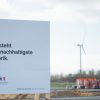At the ADIPEC oil and gas conference in Abu Dhabi on Monday, chief executives from major energy companies defended their industry amid growing criticism and climate activism. They acknowledged the challenges of balancing energy needs with the global push for a transition to cleaner sources.
Recent climate protests and a major U.N. report highlight that current efforts are insufficient to meet the Paris Agreement’s climate goals, with the world having already warmed by 1.1 degrees Celsius. This warming contributes to severe weather events worldwide.
Tengku Muhammad Taufik, CEO of Malaysia’s Petronas, emphasized the need for tough decisions and practical steps toward a decarbonized future, likening their role to something beyond merely pleasing everyone, unlike selling ice cream. He stressed that the industry must be guided by facts and rationality.

Occidental Petroleum’s CEO, Vicki Hollub, described the current period as both challenging and promising. She emphasized the importance of regaining public trust and continuing oil production to ensure energy security while addressing climate change. Hollub highlighted that innovation and clear data are crucial for overcoming current hurdles.
TotalEnergies’ CEO, Patrick Pouyanne, admitted that the industry would not satisfy all climate activists but underscored its role in providing necessary energy now and in the future.
Shell’s CEO, Wael Sawan, reflected on his role as a mix of “the worst of times” due to polarized debates and “the best of times” because of progress in low-carbon and conventional energy advancements. Despite the negative rhetoric, he remains hopeful about the ongoing efforts and advancements in the sector.

